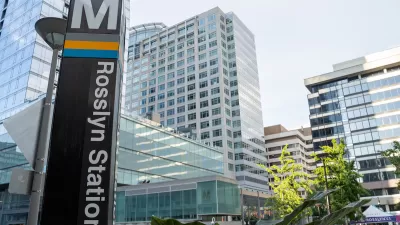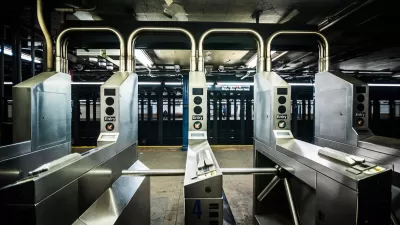Without additional funding, the region’s transit agency could be forced to reverse key changes that have improved service in the past year.

The major improvements experienced by Washington, D.C.-area transit riders could come to and end next year, according to a TransitCenter blog post. “This week, WMATA leaders released an outline of doomsday funding scenarios, which include severe service cuts that could eliminate bus routes, reduce rail hours, create longer waits between trains, and close down stations.”
The blog post outlines some of the most significant improvements in the last year, noting that “Metro will have 58 percent more trains in service on weekdays compared to July 2022 and provide 73 percent more train trips.” The agency also has several other improvements on deck, such as all-door boarding, which begins this fall.
“WMATA is an essential part of the DC region’s economy, and service cuts of this magnitude would be devastating for the mobility of the region,” the post continues. But “As of September, WMATA’s budget gap totals $750 million. If the agency isn’t able to close the gap by next summer, it will lose all of the progress that’s been made and will have to start initiating hiring freezes and layoffs that would dramatically reduce systemwide operating hours and cause increased wait times for passengers.”
FULL STORY: On the Brink: Will WMATA’s Progress Be Erased by 2024?

Planetizen Federal Action Tracker
A weekly monitor of how Trump’s orders and actions are impacting planners and planning in America.

Congressman Proposes Bill to Rename DC Metro “Trump Train”
The Make Autorail Great Again Act would withhold federal funding to the system until the Washington Metropolitan Area Transit Authority (WMATA), rebrands as the Washington Metropolitan Authority for Greater Access (WMAGA).

The Simple Legislative Tool Transforming Vacant Downtowns
In California, Michigan and Georgia, an easy win is bringing dollars — and delight — back to city centers.

The States Losing Rural Delivery Rooms at an Alarming Pace
In some states, as few as 9% of rural hospitals still deliver babies. As a result, rising pre-term births, no adequate pre-term care and "harrowing" close calls are a growing reality.

The Small South Asian Republic Going all in on EVs
Thanks to one simple policy change less than five years ago, 65% of new cars in this Himalayan country are now electric.

DC Backpedals on Bike Lane Protection, Swaps Barriers for Paint
Citing aesthetic concerns, the city is removing the concrete barriers and flexposts that once separated Arizona Avenue cyclists from motor vehicles.
Urban Design for Planners 1: Software Tools
This six-course series explores essential urban design concepts using open source software and equips planners with the tools they need to participate fully in the urban design process.
Planning for Universal Design
Learn the tools for implementing Universal Design in planning regulations.
Smith Gee Studio
City of Charlotte
City of Camden Redevelopment Agency
City of Astoria
Transportation Research & Education Center (TREC) at Portland State University
US High Speed Rail Association
City of Camden Redevelopment Agency
Municipality of Princeton (NJ)




























